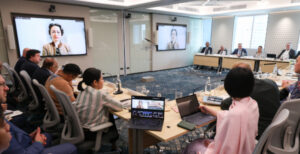The Asian Development Bank Institute (ADBI) and the Rockefeller Foundation hosted an international conference and meeting of the Global Think Tanks Cooperation Initiative to which IDOS contributed, highlighting the importance of think tank cooperation.
The conference took place on 20 and 21 March 2025 under the theme of “Future Synergies between Climate and Development” and provided a follow-up to think tank collaboration advanced by ADBI during their COP29 side-events. Bringing together leaders from global think tanks, international financial institutions, philanthropic organisations, and governments, the conference facilitated knowledge sharing, technology transfer, and skill development across regions.
The conference acknowledged the bitter feeling the COP29 left for many countries in the Global South, with a reluctantly agreed pledge from Northern countries to channel ‘at least’ $300bn a year for climate action in the South – an amount which will not nearly be enough. Against this backdrop, the conference invited to think and ultimately move beyond this deadlocked dispute by drawing up multidimensional and integrated approaches.
Prof. Anna-Katharina Hornidge contributed to the conference in a dual way. On the first day, she delivered an overarching input on “the role of think tank cooperation in geopolitically disruptive times”. This intervention highlighted the importance of joining forces for safeguarding evidenced-based policy approaches as well as fora for plurilateral and multilateral collaboration. Think tanks are in a unique position to channel rigorous research for understanding, addressing, and shaping structural change for a cooperating multipolar world. On day two of the conference, Prof. Hornidge joined the concluding discussion on “Policy Research Interface and the Way Forward”, which put into focus ways to strengthen science policy society interfaces against trends of “climate fatigue” and “climate anxiety”.

